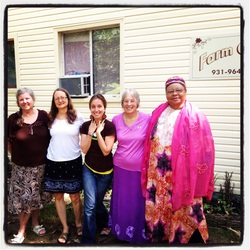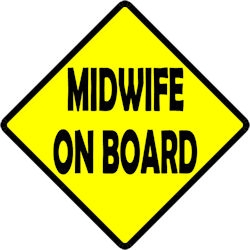 I'm not here to scare you, and you're probably already aware that in the 1950's and 60's, birth wasn't a kind animal to women. The medical industry was very excited about various "advances" in technology that left women completely out of their own birth experiences. In addition to using full anesthesia, surgeons often used forceps to deliver babies of first time mothers. This was based on bad science and I'm so grateful that we live in the world we do now, where forceps are truly reserved for times of absolute necessity. Sometime in the late sixties, a woman named Ina May Gaskin was thrilled to give birth to her first child. Determined to be a "good patient" and avoid pain medication and forceps, she stayed perfectly quiet all through her labor and tried not to attract attention. Unfortunately for her, it didn't matter. She received an episiotomy, a forceps delivery, and was separated from her baby for the first 24 hours of her life because that was the standard protocol at the time. Rather than submitting to the "standard protocol" for her subsequent births, she looked beyond the latest and greatest evidence and back in time to the way that women have been birthing their babies for millennia: at home, surrounded with like-minded women. She found a woman (Joanne Santana, pictured on the left) who had birthed a baby at home with the help of a midwife. This was the spark that she needed to set fire to the establishment of torturous birth. She and her sister-friends started a commune in Tennessee that was founded on hippie ideals like peace, love, and empowerment. For forty years now these women have salvaged the vestiges of midwifery and rekindled the practice of woman-centered birth. I spent the last seven days learning from these midwives, hearing their stories, and soaking up their strange blend of spirituality and sisterhood, and I am forever changed. Midwifery is good science with boundaries, reason, heart, and history. It offers women support to birth their babies and respects the need for intervention and surgery for those outside of those bounds. Rest assured, this is not me recommending home birth to everyone. Instead, this is me encouraging you to read Ina May's books and discover a softer side of birth. Ina May's Guide to Childbirth, Ina May's Guide to Breastfeeding, and Spiritual Midwifery. I wish for you inspiration, empowerment, peace and love in your prenatal care and birthing experience. I know this is possible. Do you?
0 Comments
 Perhaps you're nearly as confused as I was about what a “midwife” does (versus what a “doula” or your “mother-in-law” might do to support you during labor). Let me spell it out for you in super plain English. Homebirth Midwives: Are able to practice well-woman care, like pap smears and exams, and attend the births of healthy women carrying healthy pregnancies. They do not prescribe prescription medication, nor do they offer medical pain relief methods or procedures. Most often their care includes visits to your home before and after baby is born. Appointments with home birth midwives tend to be longer and more frequent than with other birth attendants. Certified Professional Midwife This woman has trained for years in both an academic and practical setting and then passed two grueling exams: one on paper, another eight-hour practical exam. It is the only credential that requires experience delivering babies both inside and outside of hospital settings. Legally, CPM's can practice in 26 states (although each state sets the standards for who may or may not practice in a medical setting like a hospital or birth center). http://www.nacpm.org/what-is-cpm.html Registered Midwife (in Colorado) This woman has trained for years in a variety of settings, from academic to apprenticeship. She must register with the state of Colorado and is the only birth professional permitted to attend home births. They must either take a training program through a recognized school or provide proof of equivalent experience and education. http://www.coloradomidwives.org/registered-midwives-and-certified-nurse-midwives Hospital Birth Midwives Somewhere between a homebirth midwife and an OB/GYN, a hospital birth midwife frequently works with healthy women carrying healthy pregnancies, but is also trained in the medical model and may offer medical interventions like pharmaceutical drugs and minor surgical procedures. Hospital birth midwives work in a medical office and do not travel to your home before or after baby is born. Their appointment times are often longer than the appointments of an obstetrician seeing a healthy pregnant woman. Certified Nurse Midwife This individual (the majority of whom are women) has a bachelor's degree in nursing and then a post-graduate degree (two years) in labor and delivery. She must practice within the scope of an obstetrician, meaning her philosophy of care is supervised/directed by a physician. http://www.midwife.org There are a whole host of organizations that offer credentials to midwives, and that is because there did not used to be a single organization. Each state had to define their own rules regarding midwifery care. Your midwife may carry a credential that is not listed here, and she may still be an excellent caregiver. Regardless of the midwife you choose, you should know that your midwife is NOT a DOULA, or a person who is dedicated as a labor support person. Midwives provide perinatal health care, but will not arrive at your labor as soon as it begins. Typically, you make several phone calls to your midwife as your labor progresses and s/he evaluates when to meet you at your house/hospital. Some home birth midwives are also trained as doulas, but they will not perform both functions at once. In the event you need or choose to transport to a hospital, your home birth midwife may serve as a doula depending on her training and scope of practice. Clear as mud? Great. Have a conversation with your provider about what services they offer and whether you'd like to invite a doula to assist you or work with the assistance of a family member/friend. Interested in learning about whether a doula is right for you? |
About meI'm one of those people who loves making your life easier (and I believe in you). I am an experienced registered prenatal yoga teacher and a lactation educator. Want more? My monthly newsletter might be for you.
Archives
April 2014
Categories
All
|
 RSS Feed
RSS Feed
